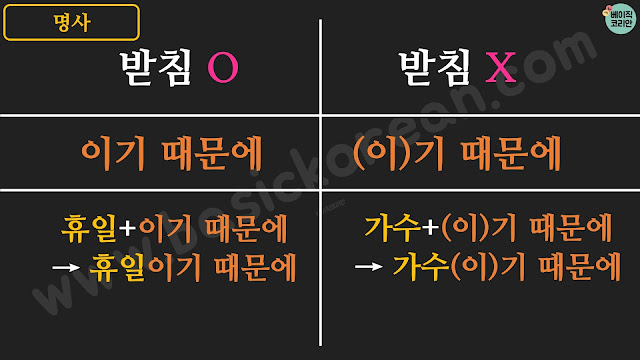Learn Korean: Korean Grammar 107: A/V-기 때문에, N-이기 때문에/기 때문에
In this lesson, we're going to learn 'A/V-기 때문에, N-이기 때문에/기 때문에.'
회사가 집에서 멀기 때문에 일찍 출근해요.
(I go to work early because the company is far from home.)
If you want to watch the lesson in Korean with English subtitles, please click the link below.
🎬 Korean Grammar 107: https://youtu.be/qHnEIDZx6k8
1. A short conversation & Pronunciation
- 나나: 미소 씨는 몇 시에 출근해요?
(Miso, What time do you go to work?)
(Miso, What time do you go to work?)
- 미소: 저는 새벽 6시에 집에서 나와요.
(I leave home at 6 o'clock in the morning.)
(I leave home at 6 o'clock in the morning.)
- 나나: 왜 이렇게 일찍 나와요?
(Why do you come out so early?)
(Why do you come out so early?)
- 미소: 회사가 집에서 멀기 때문에 일찍 출근해요.
(I go to work early because the company is far from home.)
(I go to work early because the company is far from home.)
→ The grammar we're going to learn today is '멀기 때문에.'
2. Usage
 |
| A/V-기 때문에, N-이기 때문에/기 때문에 |
► '기 때문에' and '(이)기 때문에' attach an adjective/a verb stem and a noun respectively.
► It is used to talk about the reason or cause.
► It is mainly used in writing or in formal situations
(1) Adjective
▶ 회사가 집에서 멀어요. + 일찍 출근해요. (The company is far from home. + I go to work early.)
- 일찍 출근해요. (I go to work early.) - Why?
- 회사가 집에서 멀어요. (The company is far from home.) - It is talking about the reason for the content that follows.
- In this case, you can connect these two sentence with '기 때문에.'
→ Then you can say: 회사가 집에서 멀기 때문에 일찍 출근해요.
(I go to work early because the company is far from home.)
(I go to work early because the company is far from home.)
- '멀기 때문에' is a combination of the adjective '멀다 and '기 때문에.'
 |
| A/V-기 때문에, N-이기 때문에/기 때문에 |
(2) Verb
▶ 저는 매일 운동해요. + 건강해요.
- 건강해요. (I'm healthy.) - Why?
- 저는 매일 운동해요.(I exercise every day.) - It is talking about the reason for the content that follows.
- In this case, you can connect these two sentence with '기 때문에.'
→ Then you can say: 저는 매일 운동하기 때문에 건강해요.
(I am healthy because I exercise every day.)
(I am healthy because I exercise every day.)
- '운동하기 때문에' is a combination of the verb '운동하다 and '기 때문에.'
 |
| A/V-기 때문에, N-이기 때문에/기 때문에 |
(3) Noun
▶ 오늘은 휴일이에요. + 이 곳에 주차를 해도 돼요.
- 이곳에 주차를 해도 돼요. (You can park here.) - Why?
- 오늘은 휴일이에요. (Today is a holiday.) - It is talking about the reason for the content that follows.
- In this case, you can connect these two sentence with '기 때문에.'
→ Then you can say: 오늘은 휴일이기 때문에 이 곳에 주차를 해도 돼요.
(It's a holiday today, so you can park here.)
(It's a holiday today, so you can park here.)
- '휴일이기 때문에' is a combination of the noun '휴일' and '이기 때문에.'
 |
| A/V-기 때문에, N-이기 때문에/기 때문에 |
4. Grammar Information
(1) -았/었/했기 때문에 (O) | -겠기 때문에 (X)
▶ -았/었/했- (O): '-기 때문에' can be used with the past tense '-았/었/했-.'
→ 눈이 많이 왔기 때문에 길이 미끄러워요. (오다 + 았 + 기 떄문에) (O)
(The road is slippery because it snowed a lot.)
(The road is slippery because it snowed a lot.)
- '왔기 때문에' is a combination of the verb '오다', the past form '-았-' and '기 때문에.'
▶ -겠- (X): '기 때문에' cannot be used with '-겠-' which is the future/speculation expression.
→ 눈이 많이 오겠기 때문에 길이 미끄러울 거예요. (오다 + 겠 + 기 때문에) (X)
(Because it will snow a lot, the road will be slippery.)
(Because it will snow a lot, the road will be slippery.)
 |
| A/V-기 때문에, N-이기 때문에/기 때문에 |
(2) '기 때문에' cannot be used in imperative and propositive sentences.
▶ Imperative Sentence (명령문) (X)
→ 날씨가 춥기 때문에 옷을 따뜻하게 입으세요. (X)
(Wear warmly because the weather is cold.)
(Wear warmly because the weather is cold.)
- '춥기 때문에' and the command expression '입으세요' are used together. And this is the wrong sentence.
- '기 때문에' cannot be used in imperative sentences.
▶ Propositive Sentence (청유문) (X)
→ 날씨가 춥기 때문에 옷을 따뜻하게 입읍시다. (X)
(Let's wear warmly because the weather is cold.)
(Let's wear warmly because the weather is cold.)
- '춥기 때문에' is used the proposal expression '입읍시다'. And this is the wrong sentence.
- '기 때문에' also cannot be used in propositive sentences.
 |
| A/V-기 때문에, N-이기 때문에/기 때문에 |
5. Combination Information
(1) Adjective/Verb | Final Consonant O & X: -기 때문에
- Whether an adjective/a verb stem has the final consonant or not, '기 때문에' is used for both cases.
(Adjective)
- Final Consonant O: 작다 + 기 때문에 → 작기 때문에
- Final Consonant X: 크다 + 기 때문에 → 크기 때문에
 |
| A/V-기 때문에, N-이기 때문에/기 때문에 |
(Verb)
- Final Consonant O: 먹다+ + 기 때문에 → 먹기 때문에
- Final Consonant X: 오다 + 기 때문에 → 오기 때문에
 |
| A/V-기 때문에, N-이기 때문에/기 때문에 |
 |
| A/V-기 때문에, N-이기 때문에/기 때문에 |
(2) Noun |
1) Final Consonant O: -이기 때문에
- When the preceding noun has the final consonant, '이기 때문에' is used.
- 휴일 + 이기 때문에 → 휴일이기 때문에
- 학생 + 이기 때문에 → 학생이기 때문에
 |
| A/V-기 때문에, N-이기 때문에/기 때문에 |
2) Final Consonant X: -(이)기 때문에
- When the preceding noun does not have the final consonant, either '기 때문에' or '이기 때문에' can be used.
- 가수 + (이)기 때문에 → 가수(이)기 때문에
- 영화 + (이)기 때문에 → 영화(이)기 때문에
 |
| A/V-기 때문에, N-이기 때문에/기 때문에 |
 |
| A/V-기 때문에, N-이기 때문에/기 때문에 |
5. Practice
- 나나 씨는 성격이 좋기 때문에 인기가 많아요. (좋다 + 기 때문에)
(Nana is very popular because she has a good personality.)
(Nana is very popular because she has a good personality.)
- 열심히 공부했기 때문에 대학에 합격할 수 있었어요. (공부하다 + 했 + 기 때문에)
(Because I studied hard, I was able to get into college.)
(Because I studied hard, I was able to get into college.)
- 지금은 퇴근 시간이기 때문에 길이 복잡할 거예요. (퇴근 시간 + 이기 때문에)
(Because it's quitting time now, the road will be crowded.)
(Because it's quitting time now, the road will be crowded.)
- 미소: 나나 씨는 몇 시에 출근해요?
(Nana, what time do you go to work?)
(Nana, what time do you go to work?)
- 나나: 저는 8시 반쯤에 집에서 나와요.
(I leave the house around 8:30.)
(I leave the house around 8:30.)
- 미소: 천천히 나올 수 있어서 좋겠어요.
(It would be nice to be able to come out slowly.)
(It would be nice to be able to come out slowly.)
- 나나: 네, 그리고 집이 회사에서 가깝기 때문에 걸어서 다녀요.
(Yes, and I walk to the office because the house is close to the office.)
(Yes, and I walk to the office because the house is close to the office.)
→ The grammar we've learned today is '가깝기 때문에': 가깝다 + 기 때문에
Thank you~!
#베이직코리안 #한국어문법 #Basickorean #Koreangrammar


_basickorean.jpg)
